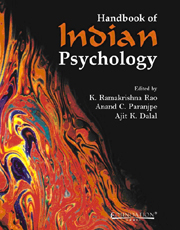Book contents
- Frontmatter
- Contents
- Contributing Authors
- Preface
- 01 Prologue: Introducing Indian Psychology
- 02 Indian Thought and Tradition: A Psychohistorical Perspective
- PART I SYSTEMS AND SCHOOLS
- 03 Jaina Psychology
- 04 The Foundations of Early Buddhist Psychology
- 05 Varieties of Cognition in Early Buddhism
- 06 A Buddhist Theory of Unconscious Mind (Ālaya-Vijñāna)
- 07 Indian Buddhist Theories of Persons
- 08 Buddhist Psychology: A Western Interpretation
- 09 Transpersonal Psychology in the Bhagavad-Gītā: Reflections on Consciousness, Meditation, Work and Love
- 10 Yoga Psychology: Theory and Application
- 11 Patañjali Yoga and Siddhis: Their Relevance to Parapsychological Theory and Research
- 12 Yoga Psychology and the, Sāṃkhyā Metaphysic
- 13 Psychology in the Advaita Vedānta
- 14 The Nyāya-Vaiśeṣika Theory of Perceiving the World of our Experience
- 15 Psychological Theories and Practices in Āyurveda
- PART II TOPICS AND THEMES
- PART III APPLICATIONS AND IMPLICATIONS
- Pronunciation and Transliteration of Sanskrit Alphabet
- Glossary
- Index
13 - Psychology in the Advaita Vedānta
from PART I - SYSTEMS AND SCHOOLS
Published online by Cambridge University Press: 26 October 2011
- Frontmatter
- Contents
- Contributing Authors
- Preface
- 01 Prologue: Introducing Indian Psychology
- 02 Indian Thought and Tradition: A Psychohistorical Perspective
- PART I SYSTEMS AND SCHOOLS
- 03 Jaina Psychology
- 04 The Foundations of Early Buddhist Psychology
- 05 Varieties of Cognition in Early Buddhism
- 06 A Buddhist Theory of Unconscious Mind (Ālaya-Vijñāna)
- 07 Indian Buddhist Theories of Persons
- 08 Buddhist Psychology: A Western Interpretation
- 09 Transpersonal Psychology in the Bhagavad-Gītā: Reflections on Consciousness, Meditation, Work and Love
- 10 Yoga Psychology: Theory and Application
- 11 Patañjali Yoga and Siddhis: Their Relevance to Parapsychological Theory and Research
- 12 Yoga Psychology and the, Sāṃkhyā Metaphysic
- 13 Psychology in the Advaita Vedānta
- 14 The Nyāya-Vaiśeṣika Theory of Perceiving the World of our Experience
- 15 Psychological Theories and Practices in Āyurveda
- PART II TOPICS AND THEMES
- PART III APPLICATIONS AND IMPLICATIONS
- Pronunciation and Transliteration of Sanskrit Alphabet
- Glossary
- Index
Summary
There is voluminous literature on Advaita Vedānta available at different levels of scholarship. Much of it, however, is basically philosophical with a sprinkling of psychology here and there. We believe that psychological issues are at the base of Advaita and in a significant sense constitute its core. In this chapter we are attempting to convey psychological concepts and methods of Advaita with a focus on the concerns of modern psychology, and present them in contemporary language and idiom. Also, wherever appropriate, we will try to build conceptual bridges across disciplinary and cultural divides, and attempt interpretations rather than mere translations.
The two topics at the very core of Advaita system are consciousness and the self. Centrality of consciousness in human condition is the defining characteristic of Indian psychology (Rao, 2004). They were also issues central to modern psychology as viewed by its founding fathers, Wilhelm Wundt in Germany and William James in America. However, with the advent of behaviourism, both these topics were virtually banished from psychology for decades. Such banishment turned out to be a relatively temporary aberration; both consciousness and self have returned to the re-drawn boundaries of psychology during the last few decades of the twentieth century. From a psychological point of view, there is more to Advaita than consciousness and self, since it offers a broad perspective on the nature of human beings, a perspective of the kind that modern psychologists call “theories of personality”. According to the Advaita, the person (jīva) is conceptualized as an individual who thinks, feels, and acts. As such, the individual is seen as being in possession of three fundamental capacities: cognition, emotion, and action.
- Type
- Chapter
- Information
- Handbook of Indian Psychology , pp. 253 - 285Publisher: Foundation BooksPrint publication year: 2008
- 5
- Cited by

